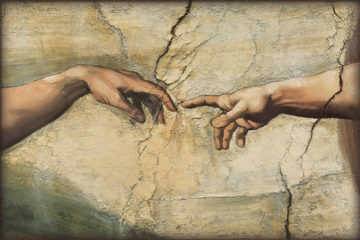Jesus & A Better World

I think we would all like to see the world become a better place. We would like to look at the future with a sense of hope and optimism. We would like to see ourselves as being one of the “good guys” and part of the solution – or at least not a living roadblock to the world becoming better.
The problem with the world becoming a better place and us being a part of it is that we rarely understand the problem or the solution, and we put our faith in things that can’t help but mislead us and let us down – government, political parties, politicians, smart sounding celebrities, the science industry, billionaire philanthropists, non-profit organizations, human progress, etc. I would even add misplaced faith in the church to that list, and I’ll tell you why in just a bit.
Institutions are ways that we humans organize our efforts for a common purpose. The reason why even our very best institutions are tragically flawed and corrupt, is because we are in them; people are involved. The human condition and the flaw in human nature is the problem. We can rush around and conspire for the good all we want to, we can build ever more majestic towers of Babel to give our energy and hope to, but if there is a fault line through the foundation, if the root is rotted, if there is cancer written into the DNA, we’ll never get to the place we long for. All of our creations will turn ugly or ineffectual. What is in the root will eventually show up in the leaves.
There is something in us that is the problem and we can’t escape ourselves. We can’t save ourselves. Our condition is so bad that it is hard for us to even acknowledge what the problem is and to acknowledge that we need a savior; admit that we need a healer. We often find it less painful and more palatable to go on pretending that we’re all okay. But as any twelve step recovery group would tell us, admitting that we can’t save ourselves and daring to believe there is someone who can is where hope begins.
Listen to what flawed human being, Ezra Taft Benson, observed about the cure for the human condition:
The Lord works from the inside out.
The world works from the outside in. The world would take people out of the slums.
Christ would take the slums out of people, and then they would take themselves out of the slums.
The world would mold men by changing their environment.
Christ changes men, who then change their environment.
The world would shape human behavior, but Christ can change human nature.
Knowing this is THE thing that makes the church different than other institutions. It isn’t that the church is full of perfect people – far from it. The difference is that church is a group of people who are profoundly aware that they both need a savior, and that there is one. Neither the church in itself nor its leaders are our great hope. The power of the church and its people comes from pointing to our great and true hope. It is a group of “beggars telling other beggars where they’ve found bread.”
And it is in that spreading of God’s inside-out rescue that the world starts to heal and becomes a better place. It is through God’s healing of the human condition and the flaw in our human nature that we are set free to become all that we were made to be.
Over a decade ago, sociologist Robert Woodberry set out to discover what led certain societies to flourish while their neighbors fell further behind. What he found both shocked him and the academic world. Here is his summary:
“Areas where conversionary Protestant missionaries had a significant presence in the past are on average more economically developed today, with comparatively better health, lower infant mortality, lower corruption, greater literacy, higher educational attainment (especially for women), and more robust membership in nongovernmental associations. In short: If you want a blossoming democracy today? The solution is simple—if you have a time machine: Send a 19th-century missionary.”
Woodberry’s findings, “The Missionary Roots of Liberal Democracy,” did not receive a warm welcome in the sociology departments of modern Western academia and were challenged repeatedly. Every challenge only proved his findings to be more true.
These missionaries persuaded people all over the world to leave their old beliefs and understanding of God and morality behind and begin to follow the God of Jesus with their lives. These missionaries persuaded people that there was both a flaw in the human condition and that God was holding out the cure to them. The tangible result was that the lives of these people, the lives of their children, the lives of their children’s children, and the world today are all a much better place because they did.
These missionaries can take most of the credit for the rise and spread of stable democracies in the non-Western world. They started schools, sparked mass education, started local printing operations and newspapers, organized people to advocate for human rights to local authorities and colonial authorities, started local voluntary organizations, and revolutionized medicine and healthcare in the non-Western World. The hospitals, pharmacies, and medical schools they started did amazing things to lower infant mortality rates and raise life expectancy.
People’s beliefs in a God who gave himself up for them, led people to give up their lives to take the news of God’s rescue to the far corners of the world. As these beliefs spread to others the world began to change for the better.
Here is just one example. A woman named Amy Carmichael.
She left her home and family in 1895 and arrived in southern India where she continued serving God and the people there until her death in 1951. From the moment she arrived, she told anyone who would listen about Jesus. Despite the constant danger of execution or imprisonment, Amy set up orphanages to rescue babies and young girls from the trash heaps, from slavery, and from prostitution in the Hindu temples. Amy and her followers rescued thousands of little girls and eventually opened a home for young boys – many of whom were children of former temple prostitutes. In 1912 Queen Mary recognized her work and gave her funding to start a local hospital. In 1932 Amy was severely injured in a fall that left her bedridden for much of the last twenty years of her life, but she continued to love and serve those around her and became a prolific writer. When one woman wrote to her and asked, “What is missionary life like?” she replied, “Missionary life is simply a chance to die.” When she died in 1951 at the age of 83, no one placed a stone over her grave just like she asked, but the children that she had rescued did put a birdbath over her grave with the simple inscription “Amma,” which means mother.
The mission and hospital she started still exists today and is still a source of help, refuge, and family for hundreds of people.
If we want a better world, it starts with the One who heals the human heart.
– – – – – – – –
You may also be interested in:


